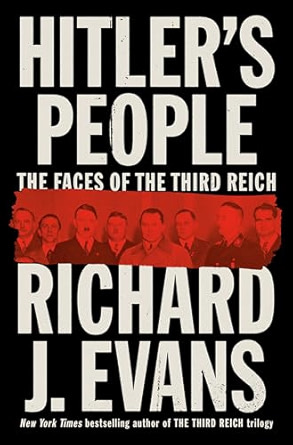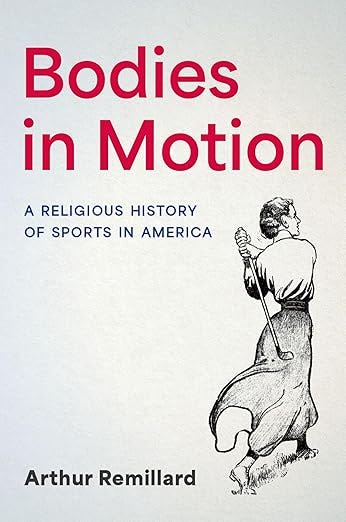My Summer Reading List
From Hitler and his people to the intersections of religion with race and sports
The week after 4th of July seems late to share a summer reading list — we’re already more than a third of the way through meteorological summer. But if only to reassure myself that there’s still a lot of summer break remaining, here are some books I’ve read so far and hope yet to read. Some are for book reviews, some are related to teaching and research, and some are just for fun or faith formation.
Beth Allison Barr, Becoming the Preacher’s Wife: How Marriage Replaced Ordination as a Woman’s Path to Ministry (Brazos Press, 2024)
I suspect most of my readers are already familiar with the author of The Making of Biblical Womanhood (and a longtime blogging colleague of mine at The Anxious Bench). But if you want an introduction to her latest best-seller, check out this recent post at my Women of Bethel research blog, on the wives of seminary students.
Charlie Bevis, Sunday Baseball: The Major Leagues’ Struggle to Play Baseball on the Lord’s Day, 1876-1934 (McFarland, 2003)
I’ll say a lot more about this older book when I share a post previewing a small project I’ll undertake this fall, asking how the history of baseball can help Christians think more robustly about the nature of sabbath. For now, suffice it to say that Bevis’ story starts with the story of mass arrests in Indianapolis in 1884 and ends with the birth of ESPN’s Sunday Night Baseball in 1990.
Richard J. Evans, Hitler’s People: The Faces of the Third Reich (Penguin, 2024)
As I prepare to teach my Modern Europe course for the first time in two years, I want to learn more from one of my favorite historians of Nazi Germany. We’ll come to Hitler himself later in this list, but for his follow-up to The Third Reich Trilogy, Richard Evans decided to profile the people who surrounded and supported the most infamous man of the 20th century: not just prominent Nazis like Hermann Göring, Josef Goebbels, and Julius Streicher, but lesser-known women like Irme Grese, Gertrud Scholz-Klink, and Luise Solmitz.
Greg Grandin, America, América: A New History of the New World (Penguin, 2025)
Grandin’s attempt to recast U.S. history as part of a larger, hemispheric story already inspired one of my more popular Substack posts this summer, on the legacy of the Dominican preacher-historian Bartolomé de Las Casas. If I were still teaching our course on Human Rights on International History, I think I’d have students read Grandin, who recovers numerous Latin American contributions to the history of democracy and human rights.
John Clifford Helt, Lydia Hosto Niebuhr: The Buried History of an Evangelical Matriarch (Pickwick, 2024)
I agreed to review this brief biography for two reasons. First, as I complete my women’s history of Bethel, I’m left more sensitive to the ways that women have helped to build Christian institutions — and why this sometimes requires historians to “[challenge] the apparent anonymity of the subject, whether protected by neglect; by traditional biography of ‘great mean, ideas, or events’; or by the subject’s own account.” What makes the mother of Reinhold and Richard Niebuhr doubly significant for me is that hers is a story of American Pietism, testifying to the “warm and irenic piety” and “ecumenical witness in the world” that was typical of the old Evangelical Synod.1
Anthony Horowitz, The Word Is Murder (Harper, 2017)
As always, I find it harder to try new fiction than non-fiction. But I’ve already worked my way through the five books (so far) in a series by a prolific British writer that I’d encountered years earlier. I already knew Horowitz from the Foyle’s War TV series and his attempts at writing new Sherlock Holmes novels, but the series that starts with The Word Is Murder is unusual because it pairs a misanthropic detective named Hawthorne with an unlikely sidekick: Horowitz himself — or at least a fictionalized version who dishes (not always reliably) on his own career.
Karen J. Johnson, Ordinary Heroes of Racial Justice: A History of Christians in Action (IVP Academic, 2025)
As with the second entry on this list, I don’t want to say too much too soon, since I’m planning at least one post for later in the summer. But I’ve been a big fan of Wheaton professor Karen Johnson since hearing her give a paper on teaching and lament at the Conference on Faith and History. Having previously published a well-received study of Black Catholics in Chicago, Johnson returns to the intersection of race and religion for a general audience book that is meant to be both informative and formative, helping Christian students of history to grow in wisdom and courage.
Arthur Remillard, Bodies in Motion: A Religious History of Sports in America (Oxford University Press, 2025)
We’re suddenly overwhelmed with good histories set at the intersection of sports and religion. Having already enjoyed Paul Putz’s The Spirit of the Game, I’m eager to read a different perspective on the same topic (and from the same publisher) by Art Remillard, whose 2013 essay on “Steelers Nation” we sometimes use to introduce religion in our spring course on the History and Politics of Sports. When I teach my next adult Sunday School class on sports as religion — coming this November at a church in my hometown, I’m sure I’ll draw on Remillard’s themes of heroism, emotion, and community.
Alec Ryrie, The Age of Hitler and How We Will Survive It (University of Chicago Press, 2025)
The only book I’ve read by one of Britain’s leading church historians is a history describing Protestantism as “the faith that made the modern world,” so I’m curious to read his argument that since 1945 we’ve replaced Jesus as a positive moral exemplar with Adolf Hitler as a negative one. Originally delivered as a series of lectures at Oxford, The Age of Hitler is ultimately about a topic that I teach all the time, World War II, so I expect to find challenging Ryrie’s explanation of being “unfashionably encouraged” (as he put it last fall in First Things) by that conflict losing its “moral centrality.”
Besides the Niebuhr brothers and their sister Hulda (an important figure in the field of religious education), that former denomination also shaped the late Walter Brueggemann, whose biographer edited Helt’s book and describes it as “a prequel to Brueggemann’s story” that “reveals more deeply what it is about Pietism as mediated by Lydia Hosto Niebuhr that made it such rich soil for the gospel to take hold then and now.”





